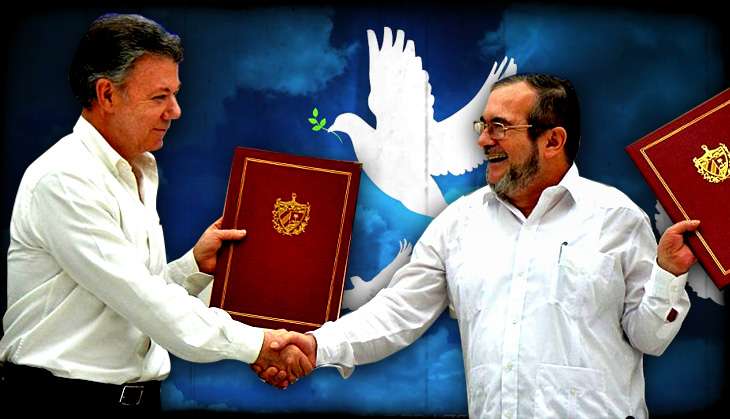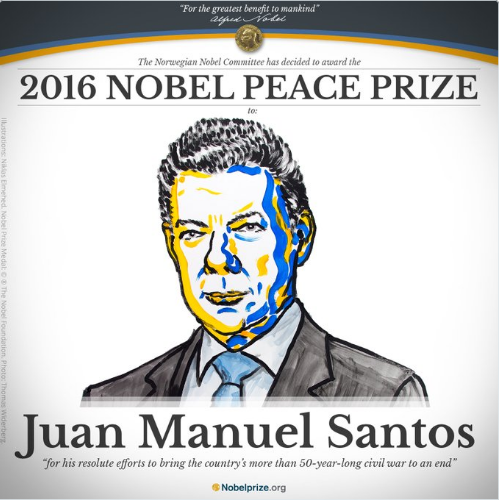In a stunning blow to this country’s hard-fought peace deal with FARC guerrillas, Colombians on Sunday rejected the pact that held out the hope of ending a half-century-long conflict…
Even as the deal seemed badly wounded, both [President Juan Manuel Santos] and the Revolutionary Armed Forces of Colombia, or FARC, said they hoped to pull peace from the wreckage…
‘We reiterate our disposition to rely only on words as our weapons to build the future,’ FARC Commander Rodrigo Londoño said in a statement after the vote.
(Miami Herald, October 2, 2016)
Actually, this stunning blow is just the latest in a year of black-swan phenomena, which has seen, among other things, Republicans nominate Donald J. Trump for president, Britons Brexit the EU, and Brazilians impeach their first female president. Of course, Americans would only punctuate this trend of unthinkable events if they elect Trump as president of the United States.
But there’s something of a black-swan phenomenon even in President Santos and FARC Commander Londoño pledging to implement the peace deal despite losing this referendum.
After all, the unthinkable analogy would be British Prime Minister David Cameron and EU President Jean Claude Juncker insisting that the UK shall remain a full member of the EU despite losing that referendum. Granted, Cameron dutifully resigned. And to complete this salutary symmetry, he would’ve had to ignore his promise to do so if the referendum failed. Evidently, Santos feels no such duty to resign.
The point is that voters are continually demonstrating an unhinged willingness to vote against enlightened national interest. This was especially pronounced in the FARC referendum because polls invariably showed that over 65 percent of Colombians favored the peace deal. Yet they rejected it 50.2 percent to 49.8 percent.
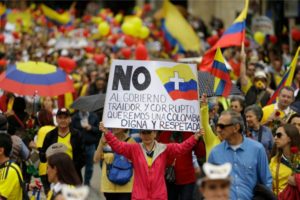 To be fair, many of those who voted against this referendum are probably still smarting from the terror and violence FARC inflicted on them and their loved ones. Indeed, these Colombians probably feel about FARC the way Miami Cubans feel about the Castros, which fuelled their opposition to Obama normalizing relations with Cuba … despite the feckless 50-year embargo.
To be fair, many of those who voted against this referendum are probably still smarting from the terror and violence FARC inflicted on them and their loved ones. Indeed, these Colombians probably feel about FARC the way Miami Cubans feel about the Castros, which fuelled their opposition to Obama normalizing relations with Cuba … despite the feckless 50-year embargo.
In any event, those who voted against it insist that the government just made too many concessions, notably promising to:
- grant amnesty to FARC rebels
- set aside 10 seats in Congress for their new political party
On the other hand, FARC made some commendable concessions too, notably promising to:
- hand over all weapons
- apologize to all victims (220,000 dead and 5 million displaced)
- pay reparations
As it happens, the new British prime minister, Theresa May, announced on Sunday that her government intends to trigger the fateful Article 50, which begins Brexit negotiations, no later than the end of March 2017. This clearly signaled her determination to honor the results of the Brexit referendum.
But frankly, I don’t blame Santos for signaling his determination to ignore the results of the FARC referendum. What’s more, I suspect even those who voted against the peace deal will eventually thank him for doing so.
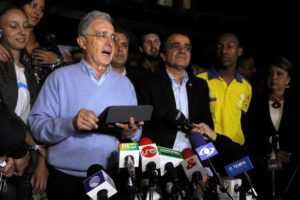 After all, nobody in his right mind can possibly think that “Plan B,” which Santos fears would return Colombia to a state of conflict, is in the national interest.
After all, nobody in his right mind can possibly think that “Plan B,” which Santos fears would return Colombia to a state of conflict, is in the national interest.
Indeed, only a delusional Trump wannabe like former Colombian President Álvaro Uribe, who wants to unseat Santos, can believe FARC rebels will surrender and march straight into prison cells. Never mind that Uribe’s delusional resentment is understandable, given that FARC attempted to assassinate him in 2002.
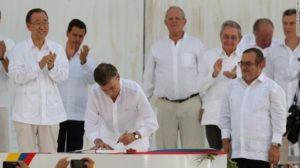 Meanwhile, UN Secretary-General Ban Ki-moon leading a delegation of world leaders to witness the signing reflects the universal support this peace deal enjoys. Not to mention the EU lifting sanctions against FARC and pledging a 600-million euro package to support its implementation.
Meanwhile, UN Secretary-General Ban Ki-moon leading a delegation of world leaders to witness the signing reflects the universal support this peace deal enjoys. Not to mention the EU lifting sanctions against FARC and pledging a 600-million euro package to support its implementation.
But it might help to have a little perspective on the leadership Santos demonstrated by striking this deal. Not least because he effectively emulated what South African President Nelson Mandela did with the deal he struck to end Apartheid.
The key features of that deal were:
- A Truth and Reconciliation Commission, which was empowered to grant amnesty to perpetrators of all crimes, including abductions, torture, and killings, provided they confessed their crimes completely and truthfully.
- A reparations program, which aimed to compensate “each victim or family” of the Apartheid regime’s 50-year reign of racist terror.
Simply put, if South Africans could accept such a deal with leaders and enforcers of Apartheid rule, Colombians should accept this similar deal with leaders and fighters of the FARC insurgency. Perhaps Santos could make it more palatable by including a Truth and Reconciliation Commission that imposes symbolic prison sentences on more notorious rebels, instead of allowing all of them to just hand over their weapons and walk Scot-free.
But if this analogy is too, er, Afrocentric for you, consider this: If Obama could negotiate a peace deal with ISIS, which calls for the terrorists to cease all attacks and renounce jihad in exchange for amnesty, would you vote against it in a national referendum?
Consider further that FARC has a lot in common with ISIS. In fact, here is how I commented on its terrorist activities in “The Hollywood-Inspired Rescue of Ingrid Betancourt and Other FARC Hostages,” July 7, 2008.
__________________
[The hostages] were being held by the Revolutionary Armed Forces of Colombia (FARC). FARC is generally recognized as a rag-tag bunch of military misfits who spout discredited communist platitudes as the clarion call for their ongoing, 50-year insurrection.
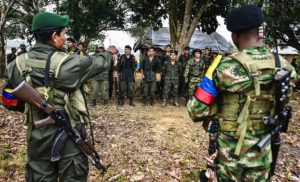 However, FARC has done little to engage the Colombian military. Instead, it has become a menace to society by kidnapping thousands of civilians for ransom every year to help fund its quixotic war. In fact, previous governments were so intimidated by its ruthlessness that FARC was able to extract all manner of concessions, including a 42, 000 sq. kilometer safe haven in 1998 from then President Andres Pastrana.
However, FARC has done little to engage the Colombian military. Instead, it has become a menace to society by kidnapping thousands of civilians for ransom every year to help fund its quixotic war. In fact, previous governments were so intimidated by its ruthlessness that FARC was able to extract all manner of concessions, including a 42, 000 sq. kilometer safe haven in 1998 from then President Andres Pastrana.
Yet, what truly distinguishes FARC is its involvement in the Colombian drug trade. Specifically, it has established a veritable business district for the production and shipment of cocaine in its ‘protected’ areas. And, as the de facto government authority, FARC collects a fee at every stage of this enterprise – from taxing the chemicals used to process coca to charging traffickers to use its airstrips. Reports are that FARC rakes in over $300 million annually from drugs alone.
___________________
Hence, FARC could probably compensate its victims more handsomely than the government that failed to protect them could.
It’s too bad that a “slight” majority of Colombians are either too aggrieved or too stupid to appreciate the historic significance of this peace deal. But Santos is right to forge ahead, the referendum be damned.
UPDATE
Nobel prize for peace rejected
October 7
The president of Colombia was awarded the Nobel Peace Prize on Friday for pursuing a deal to end 52 years of conflict with a leftist rebel group, the longest-running war in the Americas, just five days after Colombians rejected the agreement in a shocking referendum result.
The decision to give the prize to the Colombian president, Juan Manuel Santos, may revive hopes for the agreement with the Revolutionary Armed Forces of Colombia, or FARC, with whom the country has been waging the last major guerrilla struggle in Latin America.
(New York Times, October 7, 2016)
Perhaps Santos can derive some consolation, if not validation, from the Nobel Committee awarding him this year’s Peace Prize.
Of course, this is entirely consistent with the Committee’s discrediting habit of awarding this prize to peacemakers who never brokered any peace; most notably to Yasser Arafat, Yitzhak Rabin, and Shimon Peres for the ongoing Israeli-Palestinian conflict, and to Barack Obama for the ongoing wars in Iraq and Afghanistan.
Related commentaries:
Rescue of FARC hostages…
Nobel peace prize…
